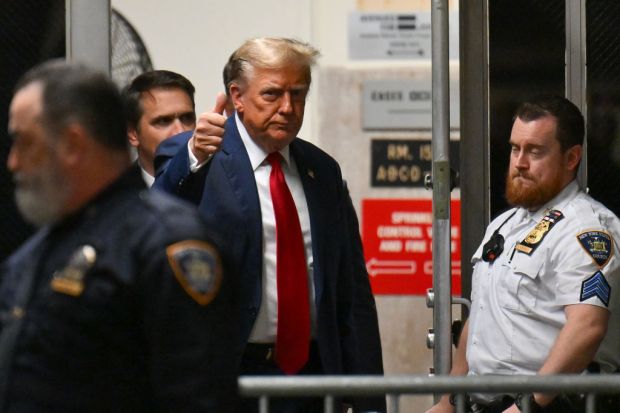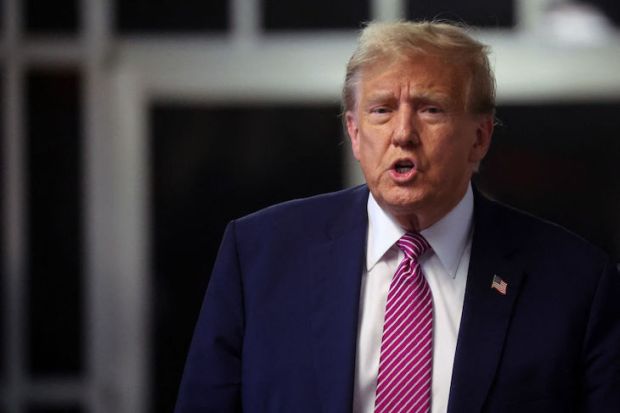The urge to compare Boris Johnson to Donald Trump was always irresistible. It has been fun, too. Both men are colourful creatures in a political environment that elevated dullards. Both men had privileged childhoods. Both are veteran womanisers with much younger wives. Both are brilliant electoral campaigners and great communicators, albeit in very different ways. Both are also much hated.
Yesterday, as Johnson’s government collapsed on top of him and he appeared to be refusing to resign, the commentariat instantly went for the ‘Britain Trump’ allusions. Johnson was desperately ‘clinging on’ to power; ‘unable to face reality’ and ‘refusing to respect the basic conventions of parliamentary democracy.’ Some Twitter blowhards even started bloviating about Johnson’s refusal to resign as comparable to Trump’s behaviour around 6 January.
It’s at such moments that the Trump-Boris comparisons break down. Boris Johnson is of course a prime minister, not a president. He has not lost an election and then refused to accept the result. Johnson has in fact simply lost control of his party – in a way that Trump never did – and he has now bowed to the inevitable and quit. ‘Nobody in politics is indispensable’, he just said in his resignation speech. That’s not something Donald Trump would say, at least not about himself.
That’s partly because Boris is in fact a very different character to Trump and a very different leader too. Trumpism was an identifiable mass movement. Johnsonianism never was, perhaps to its credit. Trump and Johnson were both loathed by the old guards of the political parties they took over – but Trump proved far more effective at bending his party to his will because he cultivated armies of loyalists. Boris never did. Trump faced down defections and rebellions because ultimately Republicans were too scared of being destroyed by Trumpist primary voters to quit. That’s not the case with Johnson. We don’t have primaries, for one thing.
Which brings us to perhaps the real similarity between Trump and Johnson: their enemies. Both men came to power thanks to the tumultuous year for democracies that was 2016. Through Brexit and ‘America First’, Johnson and Trump took on powerful but dysfunctional establishment forces and won – but not for long. Elite resentment festered: how can men of such obviously dubious character continue to defeat us? That cannot happen.
It is precisely because both leaders were so morally outrageous, so bungling and chaotic, that they exposed what Andrew Bacevich memorably called ‘the smelly little hypocrisies’ of the establishment – the morally outrageous, bungling and chaotic nature of most governments.
Trump’s specialism was to prick pomposity: to make his opponents so puffed up in rage that they stopped thinking clearly. His arrogance exposed theirs. Also, by peddling his own truths, he revealed how the political and media classes colluded to peddle theirs. Same with Boris: In Britain in the last 48 hours, we have seen so many obvious charlatans talking seriously about the importance of decency in politics.
We have seen senior political figures resigning live on air – yet the media insists that it is Johnson who, like Trump, does reality TV politics. The public don’t dislike reality TV, but voters are in despair about the people who govern them. The majority of Americans never loved or even liked Trump. But ‘anti-anti-Trumpism’ was a major phenomenon: people could see the hollowness of the politicians who stood against him. They could see – as we saw in Britain yesterday – how cravenly politicians swung from supporting him to condemning him, based on which way they thought the wind was blowing.
People despise this sordidness more than they hate any one figure. Which is why we could see an anti-anti-Boris backlash in the months and years ahead. For now, it seems Johnson’s Tory enemies have won. But, as the Prime Minister suggested yesterday, they won’t necessarily like what comes next.
Got something to add? Join the discussion and comment below.
Get 10 issues for just $10
Subscribe to The Spectator Australia today for the next 10 magazine issues, plus full online access, for just $10.




















Comments
Don't miss out
Join the conversation with other Spectator Australia readers. Subscribe to leave a comment.
SUBSCRIBEAlready a subscriber? Log in